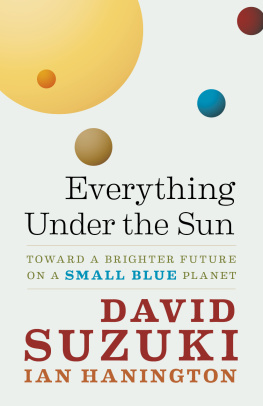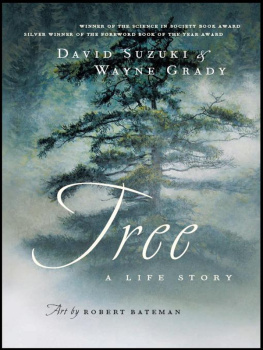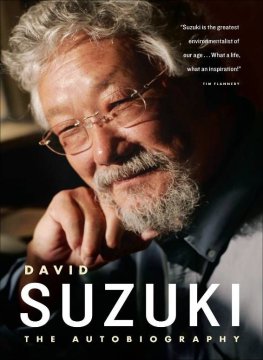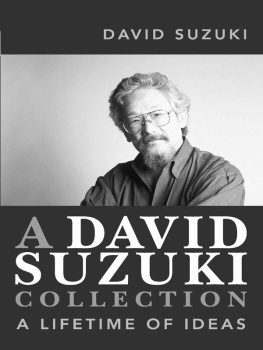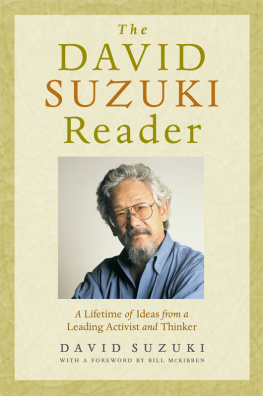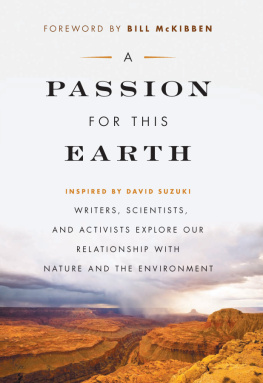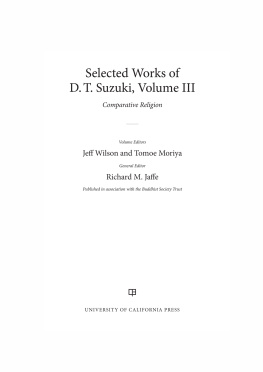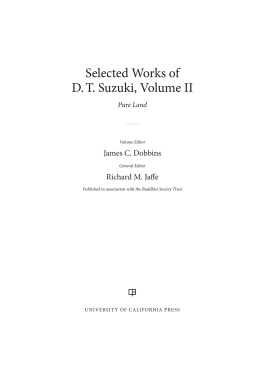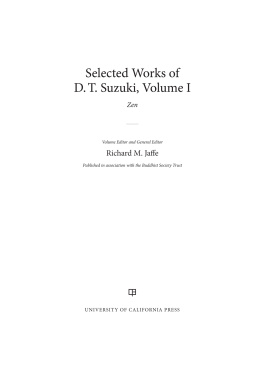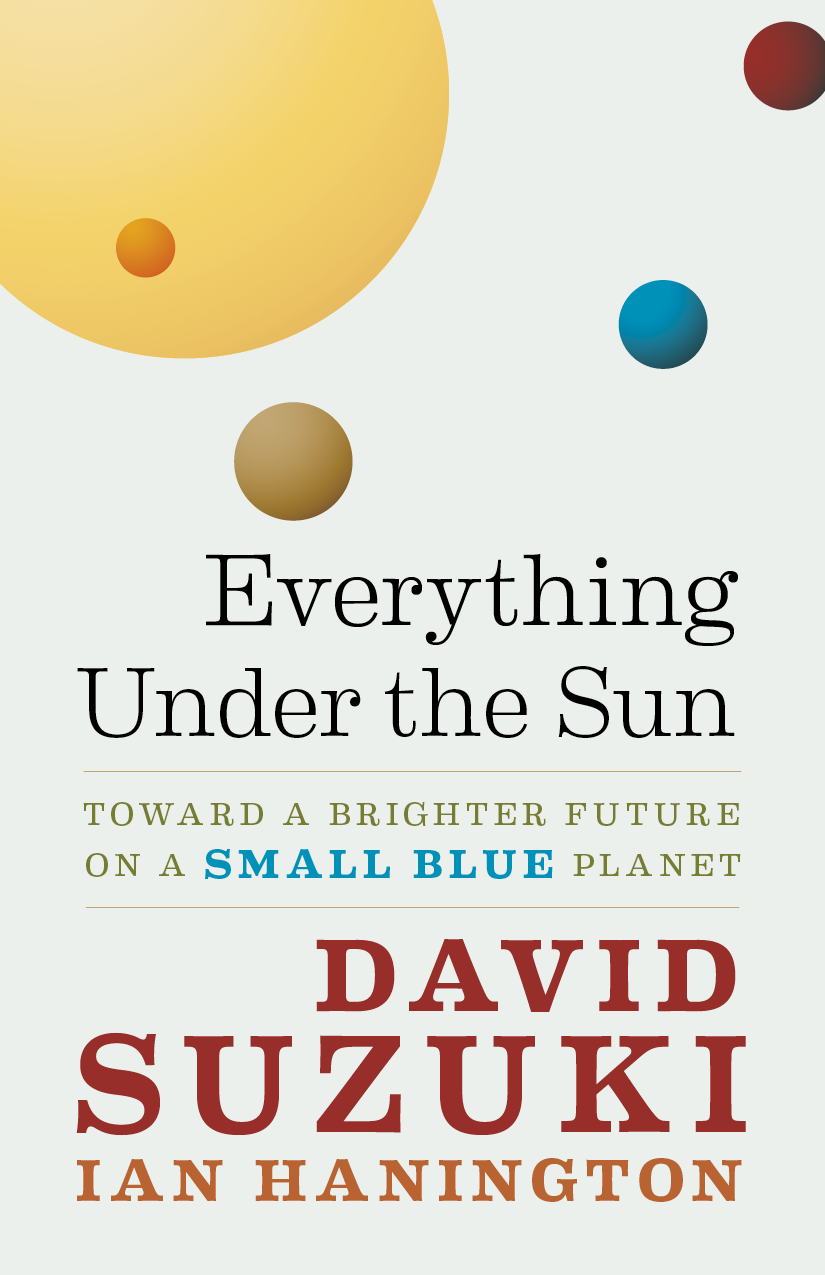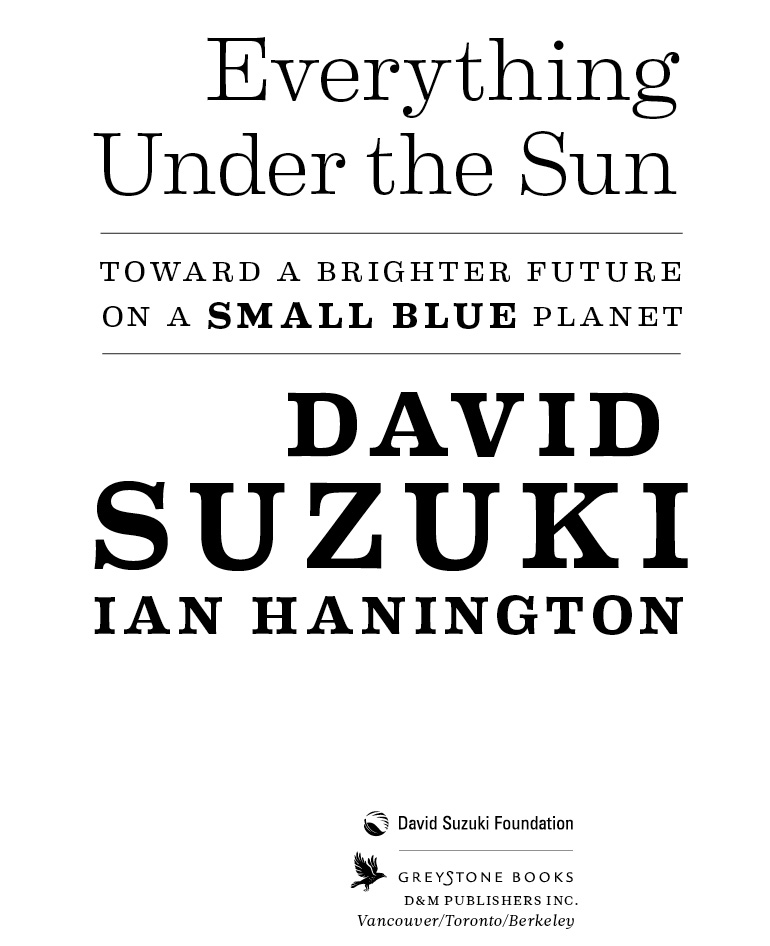Preface
O NE HUNDRED YEARS is not a long time. But if we lookat the past century, we see unimaginable change. The human population has grown exponentially, from about one and a half billion to seven billion. People have shifted from rural to urban, and now more than half of us live in citiesup to 80 per cent in developed countries. Automobiles and other amazing technological advances have allowed us to do that and so much more. But were so involved with our technology that weve designed many of our cities for cars instead of people. Our knowledge and inventions have kept pace with population growth, but that only means theyve sometimes sped ahead of our ability to plan more rationally for their use and application. And so were consuming more, wasting more, polluting more, and using up more of the earths resources.
Many people are understandably afraid of what weve gotten ourselves into. But well never get out of a jam by plugging our fingers in our ears and going lalalala or pretending everythings fine. The great scientist Albert Einstein once said, We cannot solve our problems with the same thinking we used when we created them. Humans are creative and adaptable. We must imagine a brighter future if we are to create it. And we can. But we must apply new ways of thinking and seeing.
Some people view the problems we have created as insurmountable. They believe that our current systems and infrastructure are so entrenched that it would be impossible to do anything but carry on with business as usual. But that would be folly. For the most part, modern living spaces and economies have been built around fossil fuelsfor transportation, for distribution of goods and services, for energy to provide us with comforts and products. Even if we didnt have to contend with the problems that our overuse of fossil fuels has createdfrom pollution to climate change to water contamination to ecosystem disruption to geopolitical instability and social inequitywe still have to remember that supplies of fossil fuels are limited. Even before they run out, they will be found increasingly in places that are more difficult and expensive to reachas is already happening with deep-sea drilling and tar sands.
Our financial systems have been developed over a short time to contend with the pace of our expanding populations and needs. But theyve also become instruments with which to exploit those needs and even to create needs that are illusory. The global market isnt just about producing and supplying goods and services to people; its about reaping profits that create massive disparities in wealth. And thats brought us to an absurd situation where people work more hours to produce goods they dont really need and to earn money to buy more of those goods. Its led to a system based on constant growth and ever-expanding exploitation of finite resources on a finite planet.
It just doesnt make sense anymore.
We often forget how new this economic system is, and how quickly economic systems that arent working can change. We have progressed from a time when people worked twelve or more hours a day, six days a week, with no vacations or benefits, but were still harbouring some outmoded thinking from those days. We need to learn from history. It wasnt all that long ago that many of societys leaders in civilized countries like the United States believed slavery was essential to the economy. But many people recognized that human rights and dignity are more important than an artificial economic system, and they successfully fought to abolish slavery. And, surprise, it didnt destroy the economy!
Like many previous struggles, protecting our Earth is inextricably linked with issues of social justice. Inequality, poverty, and war are often at the root of environmental problems, and they exacerbate those problems. Exploitation of people and resources around the world has allowed people in developed nations to enjoy a standard of living that is not sustainable. We simply consume too much. And people who have scarcely enough to survive are less likely to worry about large-scale environmental problems. Someone who has to feed a hungry family isnt going to worry about whether an edible plant or animal is endangered.
The global market economy that encourages inequality and exploitation is a recent invention. Note that I said invention. It is not something real and immutable, like the laws of gravity or thermodynamics. If the economy or any other system that weve invented is not working, then we must change it or replace it. It may sound difficult, but weve done it over and over again throughout our history. That doesnt mean its easy. Change in the past has often come in the wake of catastrophic wars or revolutions or arms races or space races. But, in the end, it has always involved people sitting down and talking about the problems and the best ways to overcome them. Our hope is to start thinking and talking before catastrophe strikes. Surely weve evolved to the point where we can do that.
With pollution and climate change, species extinction, and destruction of ocean and land ecosystems, we are nearing catastrophe. Some people will deny this, some will say theres nothing we can do about it, and still others will say its all part of Gods plan. But its happening, and we can and must do something about it. No matter what religious or spiritual beliefs you hold, its impossible to deny that we have been blessed with a beautiful planet that has everything we need to survive and be healthy. It is up to all of us to care for it and to keep it livable for ourselves and all the living things that share it with us.
Solutions exist. We have the science and technology. We have many intelligent and dedicated people trying to steer us on course. But we need the will and the imagination to change, and, as Einstein said, we need to think in new ways. The problem is more social than technological. We need to commit to adopting ways to live in balance with the natural systems that keep us alive, and with each other. We must recognize that our lives are possible because of a miraculous confluence of time and space, with our planet just far enough away from the sun to provide conditions for us to survive. That sun gives us all of the energyin one form or anotherthat we need. Learning how to live well under the sun means finding better ways to use that energy.
This book doesnt have all the answers. But perhaps it can contribute to the conversation, to help people think about the problems we have created and how we might resolve them. This book attempts to identify some of the solutions. But we need more ideasyour ideas. We need to be creative. We need to use our imaginations. We need to talk to each other. This book is an invitation to join the most important conversation of our time.
1. All Creatures Great and Small
S OME PARENTS HAVE taken me to task for pointing out to their children that we are all animals. Its a basic scientific fact, though. Although were blessed with large brains relative to our size, we still have a lot in common with other animals. We all need clean air, water, and food to survive. We all have an instinct for survival. But rapid exponential growth in human populations, coupled with economic systems that encourage waste and consumption, means that we often ignore the needs of the other living beings that share this world with usand we also ignore the fact that we depend on them more than they depend on us. As this chapter shows, in failing to take into consideration our fellow creatures, we also lose sight of what we truly need as humans to survive and to be fulfilled and happy.

